
Archives

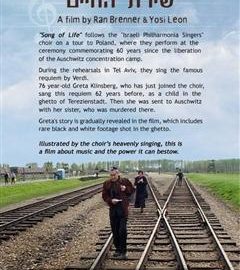
Song of Life
The documentary Song of Life follows the one hundred singers of the “Israeli Philharmonic Singers Choir ” on their tour to Poland, performing at the Ceremony commemorating 60 years since the liberation of the Auschwitz concentration camp.
At the rehearsals in Tel-Aviv the choir sings Verdi’s famous Requiem. The singers are not aware that the 76 years old lady, Greta Klinsberg, who has just recently joined the choir, sang this requiem 62 years earlier when she was a child in Terezenstadt, before being sent to the Auschwitz with her sister who was murdered there. Her story is revealed to the choir and the audience step by step as the film progresses. Greta was among the few who survived and since then she has never stopped singing.
In the course of the film we learn about some of the individual singers of the choir, and their personal connections to the Holocaust.
The documentary features songs sung by the choir and also shows some rare black & white footage of the last Opera sung by Greta as a child. This footage was taken by the Nazis in Terezenstadt before the children were sent to Auschwitz.
In general the film is about music and the power it gives to people.
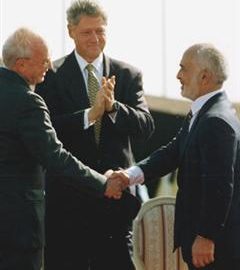
Shalom, Jordan
On the 10th anniversary of the Israeli-Jordanian peace accord, Israeli filmmaker Dov Gil-Har reveals the story behind the secret negotiations which lead to the historic treaty.
Shalom Jordan unveils the covert talks between Jordan’s King Hussein and Israeli leaders since the early 1960’s and their culmination in the historic accord sealed in 1994 on the banks of the Jordan River.
Exclusive interviews with three former heads of the Mossad, a Prime Minister, statesmen, negotiators, experts and journalists reconstruct for the first time the clandestine, fascinating and dramatic quest for peace.
Former Israeli Prime Minister Shimon Peres laments how a careless slip of the tongue drove him out of the peace process; British Lord Victor Mishcon recalls the secret talks in his private London living room, and former head of the Mossad, Ephraim Halevi, explains how he became the King’s most trusted man.
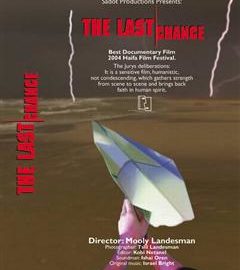
The Last Chance
This is the story of the human spirit’s journey from its very lowest point to the height of self and social -awareness. The journey takes place in the hard drug detoxification department – at the Tsalmon Prison.
The department includes Jews and Arabs who share a common fate; their relationships are totally detached from everything happening outside the prison walls. Dr. Talina Wincor is founder and director of the center. A woman within a world of men, she paves her way into the souls of her patients with a gentle touch and a firm hand.
Slowly but surely, the clichés and slogans fade away, exposing the core of the prisoners’ souls, and their choice emerges: to work on making a new life, or return to the cycle of crime and drugs.
In the framework of the treatment, two brothers meet. The younger is about to be released from the prison; the older one, who introduced his younger brother to heroin at age 14, remains in the department to deal with his past and his actions.

Summer Rains
The evacuation of Israeli settlers from the Gaza Strip and North Samaria in August 2005 provides the backdrop for Summer Rains. During the evacuation settlers were uprooted from their homes and witnessed the destruction of their childhood surroundings.
The film brings viewers into the secretive spaces of its heroes – the three highest ranking officers in the Israeli army, including IDF Chief of Staff Lt. General Dan Halutz who resigned following the Second Lebanon War. His resignation raised the question who is this man who led Israel into an adventure which claimed the lives of 126 people and caused the establishment of tens of investigative committees.
In the film we see that the evacuees are not strangers to the evacuators – many are friends, family, people who were brought up on similar values. By addressing the dilemmas that these officers face, torn between an obligation to evacuate the civilians and their personal feelings and sympathies, the film puts the viewer face-to-face with the tension of strenuous decision-making and the ongoing predicament of the dedicated officers who committed themselves to a mission they opposed.
The difficulties within the situation are magnified through the soldiers’ defense that they were “only carrying out orders” – a phrase spoken by Nazi soldiers following the Holocaust. The profound irony of using the phrase is not lost on the soldiers speaking it as they struggle to do what is right.
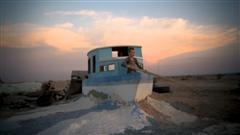
Bombay Beach

Rolling
The story of the Israeli Paralympic basketball team in the European championship.
In the past, Israel was the ultimate winner in most fields of Paralympic sports. Now, the team has to fight in order to get the World Championship.
Is it simply a story about a basketball team? – Probably not. Most of the players became diasabled during their military service and the film accompanies their stories while trying to understand what it means to be disabled.

The Key
When Margalit and Ilan fight all the village people run to hide behind closed doors, because they are not just screaming at one another. They are fighting over the most valuable object in the world: a Key! Not just any key – a 2000-year old holy synagogue key.
A year ago Margalit’s mother died at the age of 101. Since then, 76-year-old spinster Margalit Zinati feels she is the loneliest human being on the planet. As if to add to her misery, Ilan decides to come to live in her village – Pekiin, an ancient rural village in the Galilee Mountains, in order to make himself her successor. Margalit and Ilan’s grandfathers were brothers and that’s why Ilan feels he has the right to take away from Margalit her lifetime traditional and respectable role as keeper of the ancient synagogue key of Pekiin.
Margalit on the other hand, would rather kill herself or give the key to Sadam Hussein before she hands over the key to Ilan. As Margalit and Ilan’s quarrel worsens a third neighbor illegally builds a competiting synagogue next door to Margalit’s synagogue.
Margalit goes crazy, and surprisingly enough she joins forces with her worst enemy Ilan to defeat the foreign enemy who is invading the village to steal her role in history. At a rare moment of cease fire, Ilan says that his war with Margalit symbolizes the essence of the Middle East conflict but on a small scale: “When an outside enemy attacks, all the Jews, in spite of their domestic disagreements, gather & unite But when that conflict is over, the Jews will eat one another alive and the Arabs will sit on the balcony and laugh to death” he says & laughs bitterly.
Margalit and Ilan’s fierce struggle turns The Key into a tragic and ironic parable about life in a land with an excessive “over weight” of holy sites and exaggerated self -centered notion of religiousness.
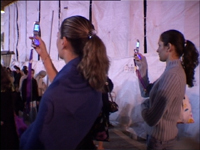
The Modern Ones
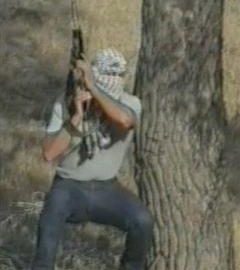
Battle of Jenin
The setting is April 2002 in a Jenin refugee camp on The West Bank. When Israel army units try to overtake the Palestinian Islamic Jihad and Fatah militants, the result is massive casualties on the sides of both the civilians and militants and severe damage to houses in this region. The question remains: What happened in Jenin? The Israelis claim it is proof of the humanitarian guidelines they followed when they decided against launching an air strike on the Palestinians, which would have caused many casualties on the part of the Palestinian people. The Palestinians, however, regard this incident as a symbol of heroism for their people, resistance against the Israeli soldiers.
The Battle of Jenin documents for the first time the testimonials of people on both sides of this struggle, highlighting moments of preparation for battle and accounts of the horrible fighting that occurred during this period. This film documents the reality that both sides knew of the human toll that would occur as a result of the fighting. Stunning footage was taken days after the battle in the refugee camp in January 2002 and May 2002.
